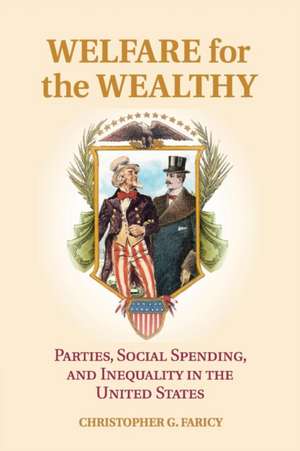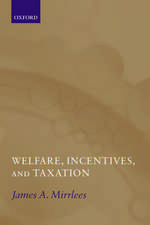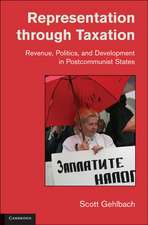Welfare for the Wealthy: Parties, Social Spending, and Inequality in the United States
Autor Christopher G. Faricyen Limba Engleză Paperback – 22 iun 2016
| Toate formatele și edițiile | Preț | Express |
|---|---|---|
| Paperback (1) | 204.86 lei 6-8 săpt. | |
| Cambridge University Press – 22 iun 2016 | 204.86 lei 6-8 săpt. | |
| Hardback (1) | 695.74 lei 6-8 săpt. | |
| Cambridge University Press – 21 oct 2015 | 695.74 lei 6-8 săpt. |
Preț: 204.86 lei
Nou
Puncte Express: 307
Preț estimativ în valută:
39.20€ • 40.93$ • 32.37£
39.20€ • 40.93$ • 32.37£
Carte tipărită la comandă
Livrare economică 15-29 aprilie
Preluare comenzi: 021 569.72.76
Specificații
ISBN-13: 9781107498402
ISBN-10: 1107498406
Pagini: 268
Ilustrații: 18 b/w illus. 22 tables
Dimensiuni: 152 x 229 x 15 mm
Greutate: 0.4 kg
Editura: Cambridge University Press
Colecția Cambridge University Press
Locul publicării:New York, United States
ISBN-10: 1107498406
Pagini: 268
Ilustrații: 18 b/w illus. 22 tables
Dimensiuni: 152 x 229 x 15 mm
Greutate: 0.4 kg
Editura: Cambridge University Press
Colecția Cambridge University Press
Locul publicării:New York, United States
Cuprins
1. The politics of social policy in America; 2. The partisan politics of the divided US social welfare state; 3. Political parties and public social spending: testing the conventional wisdom; 4. Government subsidies and the private American social system: the special case of tax expenditures; 5. A Republican welfare state?; 6. The modality of social spending and income inequality in America; 7. The implications of the divided American welfare state.
Recenzii
'Christopher Faricy provides a critically important and typically overlooked perspective on America's welfare state. By bringing tax expenditures, as well as direct government spending into the discussion, he shows that redistributive social policies are embraced by both political parties - using different policy tools and benefiting different constituencies. The powerful arguments and careful analyses in Welfare for the Wealthy enrich our understanding of both partisan politics and social welfare in the United States.' Martin Gilens, Princeton University, New Jersey
'This eye-opening book deserves a wide audience among all who want America to do a better job of limiting and reversing growing economic inequalities. Contrary to the notion that US government taxes the rich to help the poor, Faricy shows that wealthy groups and high-income workers often reap the greatest benefits from public policies, especially from hidden tax breaks and subsidies.' Theda Skocpol, Victor S. Thomas Professor of Government and Sociology, Harvard University, Massachusetts and Director of the Scholars Strategy Network
'The connections between party politics and social policy in the United States are often noted but seldom analyzed as systematically as they are in this book. Faricy shows that Democrats and Republicans disagree less over the size of the welfare state than over the beneficiaries. While Democrats favor direct spending to help the more vulnerable members of society, Republicans favor tax expenditures for the affluent. What seem like minor squabbles over policy tools thus have major implications for inequality. Previous case studies have suggested these patterns, but Faricy's statistical analysis of many programs over four decades provides a much-needed map of the entire terrain. Strongly recommended.' Christopher Howard, College of William and Mary, Virginia
'For Faricy, the real question is not some fanciful speculation about whether you can tolerate a welfare state that hampers your freedom, but rather a matter of which of these two welfare states you want: the one that spends public money to increase economic inequality, or the one that spends public money to reduce it.' The New York Times (nytimes.com)
'This eye-opening book deserves a wide audience among all who want America to do a better job of limiting and reversing growing economic inequalities. Contrary to the notion that US government taxes the rich to help the poor, Faricy shows that wealthy groups and high-income workers often reap the greatest benefits from public policies, especially from hidden tax breaks and subsidies.' Theda Skocpol, Victor S. Thomas Professor of Government and Sociology, Harvard University, Massachusetts and Director of the Scholars Strategy Network
'The connections between party politics and social policy in the United States are often noted but seldom analyzed as systematically as they are in this book. Faricy shows that Democrats and Republicans disagree less over the size of the welfare state than over the beneficiaries. While Democrats favor direct spending to help the more vulnerable members of society, Republicans favor tax expenditures for the affluent. What seem like minor squabbles over policy tools thus have major implications for inequality. Previous case studies have suggested these patterns, but Faricy's statistical analysis of many programs over four decades provides a much-needed map of the entire terrain. Strongly recommended.' Christopher Howard, College of William and Mary, Virginia
'For Faricy, the real question is not some fanciful speculation about whether you can tolerate a welfare state that hampers your freedom, but rather a matter of which of these two welfare states you want: the one that spends public money to increase economic inequality, or the one that spends public money to reduce it.' The New York Times (nytimes.com)
Notă biografică
Descriere
This book examines how political party power influences public spending and private subsidies, and how these changes affect inequality.
















